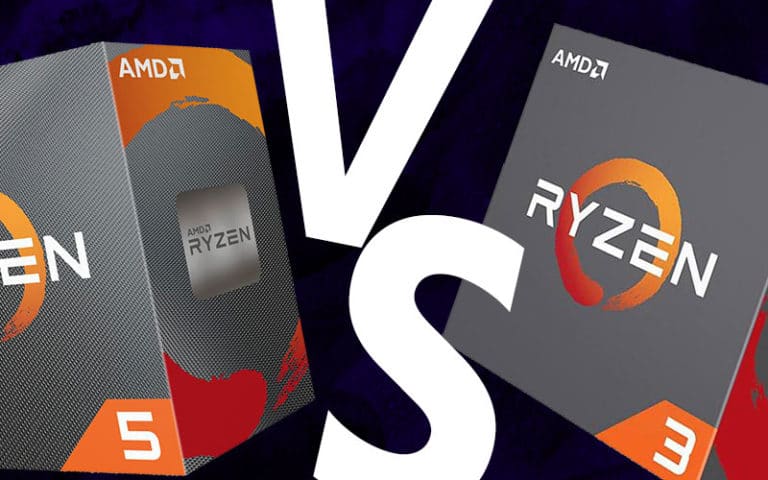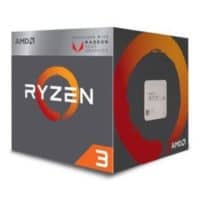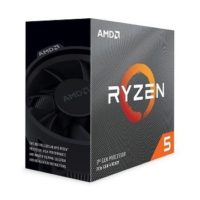Ryzen 3 vs Ryzen 5
Ah, the eternal question. which AMD CPU family is right for your next build - let's find out.

If you’re on the hunt for a new CPU to upgrade your gaming experience, you’ll definitely be considering AMD.
Within the third generation of Ryzen processors produced by AMD, you’ll encounter the Ryzen 3, 5, 7, and 9, but it doesn’t stop there. In fact, there are actually more than 20 variations of third-generation Ryzen processors! In this article, we’ve chosen to focus on the Ryzen 3 and Ryzen 5 family of CPUs.
We believe they’re some of the best options available, but we’ll walk you through their specifications so you can make up your own mind.
Specifications
AMD’s most recently developed third-generation Ryzen 3 and Ryzen 5 CPUs have been seriously improved, and they offer huge performance gains over their predecessors in the second-generation Ryzen range. Check out their specifications below to see what these upgraded processors look like in a side by side comparison.

AMD Ryzen 3 2200G

Speed
3.5 GHz -3.7 GHz
Core (threads)
4/4
Socket
AM4
TDP
65W
Good CPU and GPU performance
Overclockability
May bottleneck higher-end GPU upgrades
Will struggle with some modern games

AMD Ryzen 5 3600X

Speed
3.8GHz/4.4GHz
Core (threads)
6/12
Socket
AM4
TDP
95W
Unlocked?
Yes
PCIe Version
PCIe 4.0 x16
Total L2 Cache
3MB
Total L3 Cache
32MB
CMOS
TSMC 7nm FinFET
Max Temps
95°C
Huge overclocking headspace
Fantastic single thread performance
100+fps across the most popular AAA game titles
The 95W TDP is fairly high, especially when you consider the 3700x is only 65W
Within each family, Ryzen processors are also given a model number to distinguish between them. The general rule is that the higher the number, the more powerful the CPU is going to be. An example of this would be the Ryzen 3 1200, which can’t quite match the Ryzen 5 5600. However, if the model number end with an X, this means the CPU will boost the clock speed under certain conditions.
Clock Speed
Both the latest Ryzen 3 and 5 CPUs reach the minimum recommended requirements for gaming, which is a base clock speed of 3.5GHz. For the fastest frame rates possible, the Ryzen 5 is the better choice, with the 5 3600X boasting 3.8GHz as a base speed and a max clock speed of 4.4Ghz. As you’ll see below, however, really these are incremental improvements on what the Ryzen 3 has to offer depending which chip you choose.
Not to be completely outdone, AMD’s Ryzen 3 3100 and 3300X have been developed to be the fastest Ryzen 3 chips available, although of the two, the 3300X model takes the lead with a max boost clock of up to 4.3GHz and a higher base clock of 3.8GHz. Compared to earlier versions like the 3 31200 which has a base clock speed of 3.1GHz, this is a notable improvement.
The faster the clock speed, the quicker your CPU will run. It’s pretty simple in theory, but this is where things can start to get confusing between CPUs within the same family. In gaming, you’ll benefit more from a higher single core clock speed, but the number of cores can also play a part in how well your PC performs.
Cores
The Ryzen 3 has up to 4 core processors, exceeded by the Ryzen 5 which has up to 6 cores. That doesn’t sound like a huge difference, right? Actually, you’d be wrong to think this, although there’s obviously not quite as much of a quality gap as there is between the Ryzen 3 and the Ryzen 9, which boasts up to 16 cores.
Ryzen 5 pulls ahead in this respect, as more cores allow for more advanced multitasking which is something to consider if you’re streaming and gaming from the same PC.
Threads
Every Ryzen 3 CPU has 8 threads, whereas Ryzen 5s have 12. The latter is therefore better at simultaneously processing commands. The boosted performance of multithreading CPUs is highly beneficial for demanding applications like rendering 3D imagery.
Although a larger number of games don’t see large benefits from multithreading, due to their reliance on 1-2 threads. However, demanding titles like Witcher 3 and Cyberpunk 2077 will see performance improvements with more cores and threads.
Socket
Unlike Intel who’ve released their 10th generation CPUs with a new LGA 1200 Socket, AMD have decided to go down the accessibility route and have designed their new generation of Ryzen 3 and Ryzen 5 processors with AM4 sockets.
If you intend to upgrade your CPU in the near future, it’s likely AMD will support the AM4 socket for multiple iterations. A simple BIOS update will allow your motherboard to support later CPU releases.
Cache
Seeing as this is where common commands are stored so they can be retrieved quickly, faster gameplay can also be achieved by purchasing a CPU that has a larger cache memory size. Within their Ryzen chips the 5 outperforms the 3.
The most recently released generation of the Ryzen 3, the 3100 and the 3300X both have a total cache of 18MB, compared to the 36MB of the Ryzen 5 3600X. This means it can store more of your frequently used data which can therefore be accessed quicker, resulting in smoother gameplay.
Components and Features
PCIe 4.0
The newer generations of Ryzen 3 and 5 support PCIe 4.0, therefore have a longevity that exceeds a number of popular chips that currently hold the top spots for ‘best gaming CPU’.
The latest Ryzen 3 and Ryzen 5 CPUs are all equipped with PCIe 4.0, which means they have a larger bandwidth, capable of 16GB/s transfer as opposed to the PCIe 3.0 which only offers 8GB/s. You may experience a slight improvement in frame rate speed, but the main benefit of having PCIe 4.0 is that it helps to futureproof your PC, which is especially ideal if you’re building your own.
Unlocked?
If you’re hoping to squeeze the absolute most out of your CPU’s performance, look for processors which are unlocked so you can override the maximum clock speed. All Ryzen CPUs which end in X feature this ability, including the Ryzen 3 and Ryzen 5 processors.
Typically you’ll find that overclocking lessens the gap between quality of performance between CPUs with the same core/thread counts. If you’re planning on overclocking your CPU you might also want to think about the cooling system, and whether or not the stock cools are capable of handling the higher clock speeds.
Precision Boost 2
Another way to optimize your CPUs performance for faster, smoother gameplay is AMD’s Precision Boost 2 which is found on both the Ryzen 3 and Ryzen 5 processors. In fact, the performance-boosting technology can be found in all Ryzen CPUs, allowing you to override the CPU’s clock speeds for slightly faster frame rates.
Precision Boost 2 is a way to automatically improve performance without the need of manual overclocking, providing temperature and power criteria are met.
Precision Boost Overdrive
Not to be confused with Precision Boost 2, Precision Boost Overdrive does not raise the frequency to exceed the advertised CPU clocks, which is a point of confusion for many gamers. Affecting only the Package Power Tracking (PPT), Thermal Design Current (TDC), and Electrical Design Current (EDC), it temporarily increases their clock speeds by a maximum of 200MHz without affecting the other cores.
This is available to activate on any motherboard that supports third-generation Ryzen chips, but the benefits of this technology are subjective to a number of variables, including the motherboard, processor, cooling solution, room temperature, and your star sign. Okay, one of those isn’t true, but trying to qualify exactly how PBO would boost performance without first knowing more about each of these components is about just as precise that last one.
Performance
In order to test how each of these CPUs compare in terms of performance, which is ultimately what you’re looking to get out of them, we ran multiple tests with different games to see which one had the most to offer for gamers.
In games like Far Cry New Dawn and Ghost Recon Breakpoint, the Ryzen 5 took the lead and consistently outperformed the Ryzen 3 CPUs. When tested against each other both at base and max clock speeds, we could tell that the Ryzen 5 CPUs offered faster frame speeds nearly every time.
The gap was definitely slighter in games like Battlefield 5, but Shadow of the Tomb Raider and Red Dead Redemption 2 demonstrate how those extra two cores come into play for CPU demanding games. Here, the Ryzen 3 offered faster frame rates by almost 20% compared to the 5, and a markedly improved performance.
It’s with gaming in mind that choosing the perfect processor becomes a more challenging task, as you have to decide between which features will be most beneficial to you. Games are gradually becoming more taxing on your CPU, and while quad core CPUs like the Ryzen 3 just about toe the line with contemporary titles, they won’t do much in the way of future-proofing your PC.
Pricing and Availability
While AMD’s Ryzen 5 2600 previously held the title for best budget gaming CPU, they’ve since been beaten out by the Ryzen 3 3100. With its lower price point and decent performance, the Ryzen 3 is more accessible than a lot of CPUs and is widely available to purchase. The Ryzen 5 may have captured more media attention, but the Ryzen 3 has captured the hearts of the mass market of gamers who don’t want to spend a fortune, but don’t want to compromise too much on quality, either.
The newer released Ryzen 5 CPUs are priced more aggressively to put them in direct competition with their rival Intel Core i5 family, and are undeniably a step up from the Ryzen 3 for gamers who can afford it. They offer excellent value for money and a pretty impressive performance when it comes to gaming.
Conclusion
Any serious gamer will know that there’s no one-size-fits-all when it comes to CPUs, so the battle of the Ryzen 3 vs. the Ryzen 5 ultimately comes down to the style of gaming you enjoy, and what you’re hoping to get out of it.
On a specifications level, the Ryzen 5 model outperforms the Ryzen 3 model in pretty much every category, and the ones that it does not outperform in, it operates at least equally to the Ryzen 3 model. In terms of features, the two different models share a lot of components which makes it difficult to tell which is the better option based on features and components alone.
Due to all of its excellent specifications, the Ryzen 5 performs better than the Ryzen 3, however, it is significantly more expensive than the cheaper option. So if you wanted to buy a CPU based on performance alone, Ryzen 5 is the best choice, however, if you are looking for a cheaper option, Ryzen 3 still does a great job.

